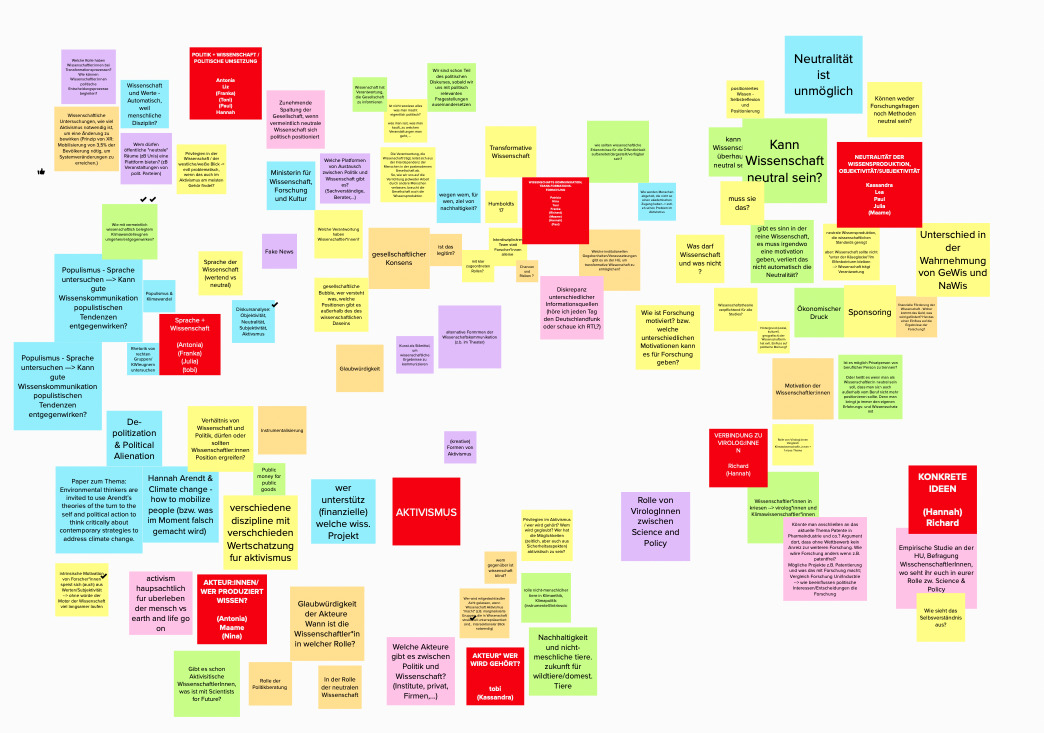Humboldt-Scholarship
Bachelors & Masters
2021/22 Science Communication
The Humboldt-Scholarship 2021/22 is conducting interdisciplinary research in the interplay between science and society. The students focus on the contemporary challenge of scientific communication and the exchange between the scientific realms and societies, asking how and in which formats scientific communication can be effective. Additionally, the funding of research projects as well as the self-perception of scientists at Humboldt university are investigated. Lastly, the outcomes of the 2020/21 class in the field of academic travel and sustainability challenges are edited as an accessible policy brief.
In four groups, the students use multiple quantitative and qualitative methods including expert-interviews, surveys, go-alongs and quantitative analysis of databases to approach their research questions. Their aim is to study and question interrelations of science, society, and politics, disclose coherences, dependencies and independencies between multiple actors and jointly discuss the outcomes of their research groups.
Final report: Abschlussbericht Themenklasse 2021-2022

Julia Bartsch, Kassandra Jensch
The students carry out research on the financing and funding of research projects at the Humboldt-Universität, with special regard to interdisciplinary projects. Guiding questions include the transparency of scientific funding, the particular development and trend in funding of interdisciplinary projects and the differences in funding and availability of subsidies for different types of scientific projects. In analyzing available data sheets („Drittmittelstatistik“) from the years 2013-2018 as well as reports from the Humboldt-Innovation GmbH, the students examine the direct and indirect implications of funding on the content orientation of research projects.
Richard Berner, Nina Dwerlkotte, Antonia Gipp, Antonia Rudolf, Jana Stahl, Patricia Usée, Jonas Wittern
Which formats are suited for scientific communication at the Humboldt-Universität? To answer this question, the students examine the motivations, needs, chances as well as barriers of scientific events, with special regard to the Open-Humboldt Festival, taking place from the 16th to 19th of August 2021. The festival is related to the Open Humboldt strategical process, aiming at the transfer of knowledge and exchange between society and science. On the festival site and events, the students use a variety of different methods to gather information on the visitors. Besides surveys and guideline-based interviews, the students developed a form of participant observation (go-alongs) while accompanying visitors and recipients. Furthermore, expert interviews provide data on the internal strategical processes on communication processes.
Maame Afua Yeboah Appiah-Nuamah, Tobias Lechner, Hannah Prawitz, Lea Roland, Lysianne Wolf
Emerging crises with global impacts, such as climate change or the CoVID-19 pandemic, have highlighted the important but often also controversial role of scientists. In a world where decision making processes are becoming increasingly complicated and decision-makers strongly depend upon scientific information, the role of scientists and the interrelation of science, policy and politics pose an essential question and challenge. Are scientists only producing knowledge or are they also obliged to go beyond analyzing and describing, and to actively initialize, catalyze and support transformation processes? Which are the self-perceived roles of scientists and which implications do different roles have for the interplay of science, policy, and society?
To understand and structure these questions and the possible roles of scientists, the students use the terminology and framework of Pielke’s roles of scientists, who described four idealized types of scientists: Pure Scientist, Science Arbiter, Issue Advocate and Honest Broker (Pielke 2007). To answer their research question, the students use a mixed-methods approach. First, several expert interviews and semi-structured interviews will be conducted. Based on the results, a broad survey who addresses researchers at Humboldt-Universität will be prepared and distributed, focusing on the self-perception of the respondents. Lastly, the results will be analyzed, and possible implications will be discussed.
Franka Paetzke, Sophia Schroth, Paul Trabhardt, Nelly Unger
The Humboldt-Scholarship 2020/21 focused on sustainable travel at the Humboldt-Universität. The study found that a fundamental rethinking of scientific travel as well as the compensation of the CO2 emissions can help to significantly reduce HU’s ecological footprint. By implementing this, HU could take a big step towards becoming a sustainable university and perhaps even become a role model. However, it could be demonstrated that there is still considerable need for improvement in this area. While presenting the outcomes of the last year’s class to the ‘Commission for a sustainable university’, the need for concrete demands and guidelines emerged. To present the outcomes of the Humboldt-Scholarship 2020/21, this student group therefore edited and arranged an accessible, expressive policy paper. Doing so, they focused on the implementation of a greenhouse gas emission-compensation system at the HU. Their aim was to formulate guidances and courses of action to compensate GHG-emissions while illustrating their advantages, disadvantages, and limitations. The target group of the policy paper included various actors and groups involved in the KNU, possibly also displaying and presenting the paper ultimately to the Academic council at Humboldt-Universität.
References
Pielke, Jr R. A. 2007. The Honest Broker: Making Sense of Science in Policy and Politics. Leiden: Cambridge University Press.


